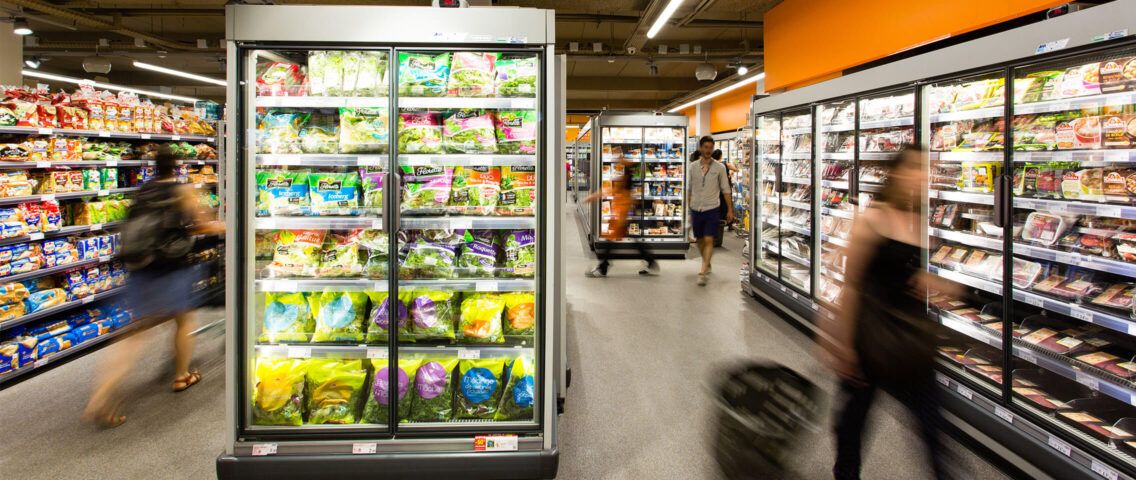A leading convenience store retailer, Franprix has some 900 store locations throughout France, mainly around the Paris area. While the majority of these locations are franchised, about one third are centrally owned and operated.
The Challenge: Decentralized Ordering Led to Operational Inefficiency
Franprix’s replenishment process was decentralized and time-consuming, with store associates placing replenishment orders manually. A lack of optimization led to unnecessary stock-outs, waste, or over-stock. This decentralized ordering model also led to delivery peaks on their typically high-volume weekends, causing capacity issues in both stores and the distribution center. Store personnel struggled to replenish shelves and deliver customer service at the same time, while excess stock often spilled out of crowded back rooms onto sales floors.
Realizing their business could no longer be supported by their existing processes, Franprix sought a supply chain solution that could:
- Automate previously manual store ordering, including for challenging fresh products
- Optimize forecasting and replenishment to increase availability and reduce food waste
- Increase operational efficiency by leveling out the flow of goods into stores so that store personnel could focus on clients and added-value services
Change Management Was Key to Rapid Transformation
Embarking on an ambitious supply chain transformation initiative, Franprix evaluated RELEX through a fresh replenishment pilot in three stores and, after strong results, chose RELEX to provide their 270 centrally managed stores with AI-driven forecasting and replenishment. They were compelled by the ability to optimize forecasting and replenishment for short shelf-life products like fresh bread to increase availability and reduce food waste.
“We were a bit late in automating forecasting and replenishment compared to our main French competitors,” admitted Franprix’s Head of Operational Excellence Arthur Caron. “However, this allowed us to move straight on to using the latest technology available, which gives us a clear competitive edge.”
Preparing for a technological step-change, Franprix developed a cohesive change management plan that ensured employees developed trust in the new tool and processes. During the roll-out phase, the company assigned up to ten “on-the-ground” employees to travel continuously to Franprix stores and speak with store managers. Mostly former store managers themselves, these change management facilitators were able to understand and speak directly to store personnel’s concerns and wishes—a key part of any change management project that is too often bypassed.
Franprix also assigned more than ten central employees to respond to store personnel during roll-out, checking store-level sales and other data in RELEX to quickly answer staff questions and adjust system parameters as needed. Much of the success of their RELEX implementation can be attributed to the investment they made in bringing store personnel on board. It took time, but it was worth it.
Results
Results at a Glance
- 67% decrease in stockouts
- EUR 1.7M (USD 2.2M) reduction in inventory value
- 30% decrease in product spoilage
- 2 pp margin improvement
Due to their thoughtful change management campaign, Franprix has seen remarkable improvements from the adoption of RELEX. The solution’s AI-driven demand forecasts have improved replenishment accuracy by automatically capturing store-SKU-level sales patterns impacted by weekday variation, seasonality, market trends, and even local weather forecasts.
The ability to leverage machine learning algorithms to automatically calculate the impact of weather data on demand has proven quite valuable for Franprix, as the impact on products and stores varies depending on a store’s location or customer base. “I noticed on the news that a heat wave was coming and thought to myself ‘shoot, I should have seen this earlier, I need to let my planners know,’” said Caron. “But when I reached out to the team, they told me not to worry. RELEX had already adjusted our forecasts based on the latest weather forecast.”
Forecast accuracy also drove improvements in store replenishment. Though Franprix stores are small, they carry a large inventory of fresh products, including meat and fish, salads and sandwiches, bread, and dairy. Taking store-level demand data into consideration, RELEX automatically optimized Franprix’s fresh and ambient product replenishment, reducing stockouts by 67%, fresh food waste by 30%, and inventory value by €1.7M.
Franprix has also benefitted from RELEX’s proactive “delivery flow smoothing,” which autonomously considers future order projections and pulls orders for long shelf-life products forward to smooth out flow of goods. With a more level, manageable flow of goods into stores, they no longer experience overwork and stress from store personnel having to replenish shelves while also meeting customer needs during footfall peaks. The risk of congesting small stores with big deliveries is much lower, and they’ve also seen improvements in DC capacity management, which was struggling with more than 500 stores placing their largest order of the week every Friday. This smoothing helped reduce DC workload by 20% on Fridays.
Beyond forecasting and replenishment, Franprix has leveraged RELEX’s powerful analytics for continuous assortment optimization. The system monitors each SKU’s sales and profitability and automatically provides recommended assortment adjustments for each store on a weekly basis. Franprix is now able to quickly excise poorly performing products and replace them with products that both better meet local demand and maximize store profitability.
“RELEX’s flexible automation makes it simple and straightforward to implement changes in accordance with our company strategy,” said Caron. “I continue to be impressed by the flexibility. The range optimization that we do with RELEX, for example, would not have been possible with any other tool.” Using that same flexibility, Franprix has been able to analyze and systematically drive down stock for long-tail products as well.
As Franprix looks to the future, that flexibility will serve them well as they continuously adapt their supply chain practices to the dynamic conditions of modern retail. RELEX will help them evolve their business well into the future, but RELEX’s team will also be there every step of the way. “The collaboration with RELEX is a true partnership,” said Caron, “and we’re going to make incredible strides together for years to come. We have many projects in mind!”
Watch the video below to see how Franprix uses RELEX.
